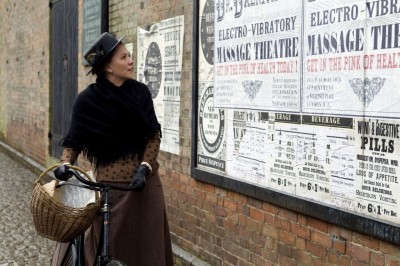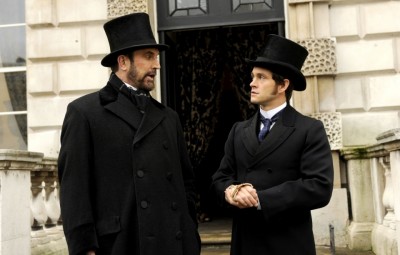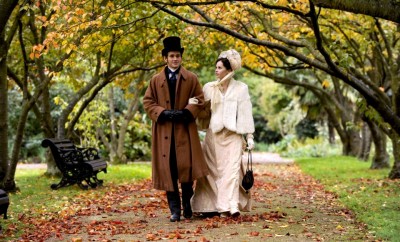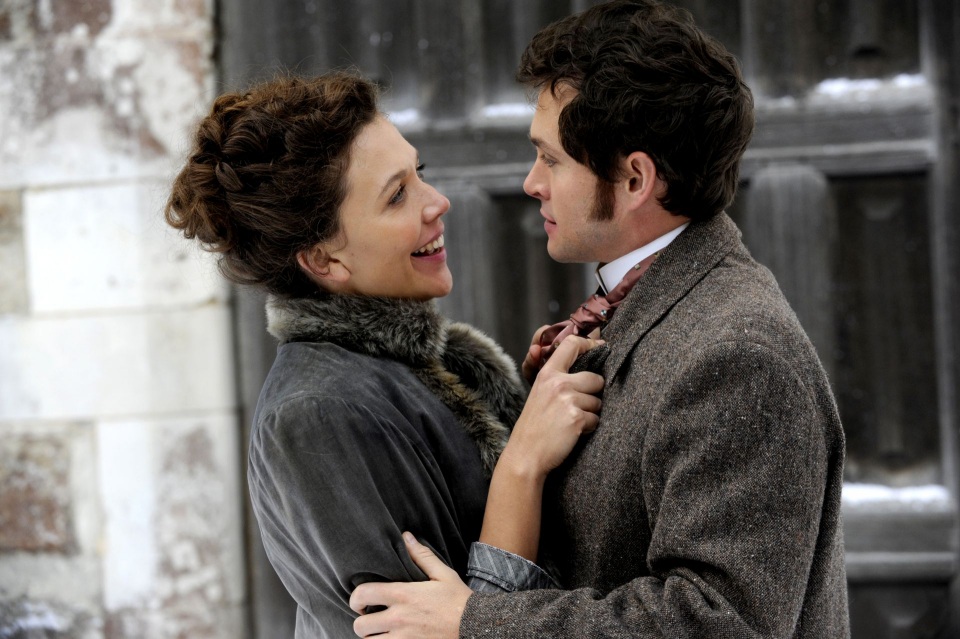“Hysteria” — a film review by Gary Chew
There’s a buzz going on now at the Tower Theater, Land Park and Broadway, Sacramento. No, it’s not a cell phone, or anything else … but a buzz among movie fans that the film, Hysteria is a bagatelle, or trifle.
That it is, yet the movie, directed by Tanya Wexler, contains a certain amount of social importance, even though it’s a delightfully entertaining movie. But, I warn you. “Hysteria” could offend anyone who continues to think women should be “kept in their place.”

The place in “Hysteria” is Victorian London… one, as many other locations during the era, that treats women for hysteria. Twenty-First century suffragettes will know what I’m talking about. And anyone who doesn’t think suffragettes exist in 2012 hasn’t been paying attention to the news.
There are female politicians out there, as I write this, who are (to borrow a phrase) “mad as hell and aren’t going to take it any more.” This is not a piece on politics, so I’ll not linger on the modern-day suffragette’s agenda, because “Hysteria” is a fun piece of cinema that shows Victorian males as very much out-of-the-loop, so to speak, regarding the needs and desires of the fully maturated female. Queen Victoria set the standard, if you remember your English history.
Maggie Gyllenhaal is Charlotte, the more spirited daughter of the an upstanding, successful physician of the day (Jonathan Pryce). He is Robert Dalrymple. Dr. Dalrymple is what might be called a forerunner in the field of Medicine categorized OB/GYN. Actually, the good doctor doesn’t handle the delivery of infants, but he does—literally—handle the external reproductive parts of women who “suffer” from hysteria, as men called it then.
His office is jammed with patients. Dalrymple then employs Mortimer Granville (Hugh Dancy), a young, progressive but straitlaced physician who is not so much entrepreneurial as he is inclined to make people well— the size of their bank balance notwithstanding. He’s had problems keeping his job in various hospitals around London due to his natural altruism.

Dr. Granville is a child of the middle-class.
Not long after employment … Dalrymple has Granville handling the, uh … patients insofar as allaying the women’s awful hysteria-like symptoms … if you know what I mean. There’s nothing explicit shown in the scenes that depict the procedure, but no doubt was left in my mind as to what Drs. Dalrymple and Granville are doing for their good patients.
Their goal is to bring on—as the good doctors refer to it— a paroxysm (spasm or fit) for the lady while she’s supine on a small table that has an appropriately placed curtain at about the patient’s pelvic region so as to not allow the attending physician see too much of his what he’s working with, if you know what I mean.
Tell me that you won’t laugh, if you see this. If you don’t think you would, you probably ought not see this film. And I suggest, if you’re not one to laugh at such entertainment, don’t worry about others, like me, who do.
Dr. Granville’s wealthy benefactor for much of his young life has been an intellectual wag named Edmund St. John-Smythe (Rupert Everett). He’s something, for sure … and has the best one-liners in the movie. St. John-Smythe is, himself, something of a progressive, as well. He tinkers with gadgets. He’s enamored with the crude telephonic device on his desk… and has even contrived a sort of electronic feather duster. LOL.

Dr. Granville has become so overloaded administering treatment to the many patients in the office that it looks as though the doctor has, for the first time in history, developed carpal tunnel syndrome in his right hand and wrist. Dr. Granville is right handed, by the way.
It’s as if a bright light blinks forth from the eyes of Granville as he fiddles, one afternoon, with St. John-Smythe’s strange feather duster gizmo that, with some alterations (he opines) might be an excellent application for the treatment of females distressed with the awful hysteria that abounds in Victorian society–for some mysterious reason.
And there it is: another example of the old adage … “Necessity is the mother of invention.” I don’t know how else to put it. Except to add that, these mothers, whether they’re mothers or not, seem to find the treatment quite useful to their needs.
Fame and fortune follow Granville and Dalrymple, and it looks like wedding bells will ring for Granville and Dalrymple’s younger daughter, Emily (Felicity Jones). She’s a very proper and intelligent young woman who is attracted to Granville, as is Mortimer to her. Emily has taken care of her father’s home since the death of Mrs. Dalrymple which occurred prior to the story’s open.
Meanwhile, in another part of London, Charlotte–remember, that’s Maggie Gyllenhaal–is slaving at her personal project of taking care of the homeless, the sick and the poor. In an argument with her, Dr. Granville even goes as far as to call Charlotte a socialist. (Such an accusation certainly rings similar to contemporary rhetoric, doesn’t it?)
Not surprisingly, father Dalrymple is most displeased with Charlotte’s efforts at aiding riff-raff from the streets of London. But he is a good bloke, just the same, if not very perspicacious especially regarding the opposite gender.
The nub of the film is what will Dr. Granville do. He’s quite attracted to both Dalrymple sisters. He seems to lean toward Emily, as he is a solid, young, professional Englishman with both feet on the ground, albeit Mort is one of those progressive kind of professionals, always seeking better ways to make life better and longer for his patients.
What will he choose, after his ascension to honorable status as a forward-looking physician who is also now making large amounts of money via his practice and the licensing of his and St. John-Smyth’s durable new product that’s taking England by storm?
Well…you’ll just have to go see the movie and find out.
Maggie Gyllenhaal is American film’s most méchant female actor. If you don’t believe me, go find that old, superlative movie, “Secretary.” She and James Spader star.
- Movie Review: ‘The Glorias’ - September 28, 2020
- Movie Review: ‘I’m Thinking of Ending Things’ - September 10, 2020
- Movie Review: ‘The Burnt Orange Heresy’ - August 31, 2020


